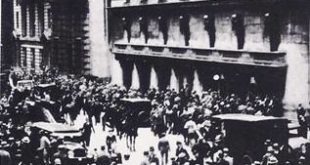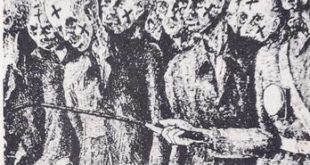As Roosevelt’s first term in office neared its end, many people in the United States — and in other countries — wondered if the New Deal could really solve America’s problems. More than that, they wondered if Americans would continue to follow the path of democracy. A wave of totalitarianism was sweeping the world; would it reach as far as America? There was no doubt that there were some Americans who supported Hitler and the Nazis. Members of the German-American Bund paraded in brown shirts and held a mass meeting in New York’s Madison Square Garden, but there were comparatively …
Read More »A Changing Nation 1934 – 1936
IN THE spring of 1933, as the New Deal roared into action, business began to get better, but it dropped again and as 1933 ended and a new year began, even the most optimistic New Dealer had to admit that the depression was still on. During 1934, the government took further steps to regulate banking and finance‚ but some Americans were dissatisfied. Businessman complained that the government was making it harder to do business. In spite of all the excitement, the NRA was not working out well. The farmers were complaining that prices of farm products were still too low. …
Read More »The New Deal 1933
WHEN Franklin Delano Roosevelt was nominated in 1932, he was fifty years old. A fifth cousin of former President Theodore Roosevelt, he came of a wealthy family. He grew up on a large estate at Hyde Park, New York, overlooking the Hudson River. At the age of twenty-four he married Eleanor Roosevelt, a distant cousin and a niece of Theodore Roosevelt. Several years after graduating from Harvard and studying law at Columbia University, he entered politics and was elected to the state senate. In the presidential campaign of 1912 he supported Woodrow Wilson, who named him assistant secretary of the …
Read More »Panic in Wall Street 1929-1932
AS MILLIONS of Americans hurried to work on the morning of October 24, 1929, it seemed like the start of an ordinary day. It seemed just as ordinary to the brokers and bankers who were entering their offices on New York’s Wall Street. True, the prices of stocks had been falling for several days, but that was nothing to worry about. There were bound to be ups and downs in the stock market and prices would surely rise again. For never before had the United States known such prosperity as it did in the 1920’s. Herbert Hoover, who had become …
Read More »The Meaning of Totalitarianism
So it happened that in many parts of the world people were living under a system of government that came to be called totalitarianism. There were differences in the governments of the totalitarian countries, but they were alike in certain important ways. In each of them, the government was controlled by one political party, usually under a dictator and no other political parties were allowed. The ruling party was not satisfied to control the government; its aim was total control of the life of its people. It controlled the courts and the armed forces, labour and industry, science and the …
Read More »Dictatorship and Civil War 1926-1939
THE END OF World War I brought many changes of government in Europe, but in a number of countries the old aristocrats and landowners still had power and the new governments could not solve the problems that faced them. Among these countries was Poland. A democratic form of government had been established, but conflicts between various parties and their leaders kept it from being very effective. General Joseph Pilsudski had helped to set up the new government of Poland. He retired from public office in 1922, when Poland adopted a democratic constitution. Pilsudski wanted a bigger and stronger Poland and …
Read More »Germany under the Nazis 1933 – 1939
IT WAS almost midnight in Berlin — a strange hour for a parade in any city, but down the street called Unter den Linden paraded thousands of students, carrying torches that flickered in the darkness. In the big square near the University of Berlin, they gathered around a great pile of books. They cheered as the books were set on fire and flames rose toward the sky. For this was the night of May 10, 1933 — less than five months since Hitler had become head of the government — the night when books were being burned in a number …
Read More »Fire in the Reichstag 1923 – 1933
DURING THE years that followed Hitler’s adventure in the Munich beer hall, ministers came and went in the German government. Among them were some able men, particularly Gustave Stresemann. He was foreign minister from 1923 until his death in 1929. His policy was to work out a way of getting along with Germany’s former enemies; so that Germany’s mighty industrial machine could operate again as it had in the past. This policy brought results. Inflation was stopped and foreign bankers made large loans to German industry. Smoke poured from the smokestacks of Germany’s efficiently run factories and the republic began …
Read More »“My Struggle”
When Hitler was discharged by the army in 1918, he found an altogether different Germany from the one he had known before the war. It was no longer ruled by a kaiser. The Socialists had taken over the government, but the Communists were active and calling for a revolution like that of Russia’s. After some fighting, the government succeeded in putting down the Communists. Their leaders, Karl Liebknecht and Rosa Luxemburg, were killed and the communist threat died down, at least for a time. In 1919, after elections, a coalition — a combination of various parties — led by the …
Read More »Revolution in a Beer Hall 1923 – 1924
ON NOVEMBER 8, 1923, about three thousand men were sitting at the tables of a large beer hall on the outskirts of Munich. They had come this evening not just to drink beer; they were to hear a speech by Gustave von Kahr. He was the head of the government of Bavaria, one of the states of Germany. Conditions had been bad in Germany since the end of World War I and Kahr’s audience was anxious to learn what the government intended to do. Kahr was still speaking when there was a commotion at the back of the ball. Several …
Read More »








